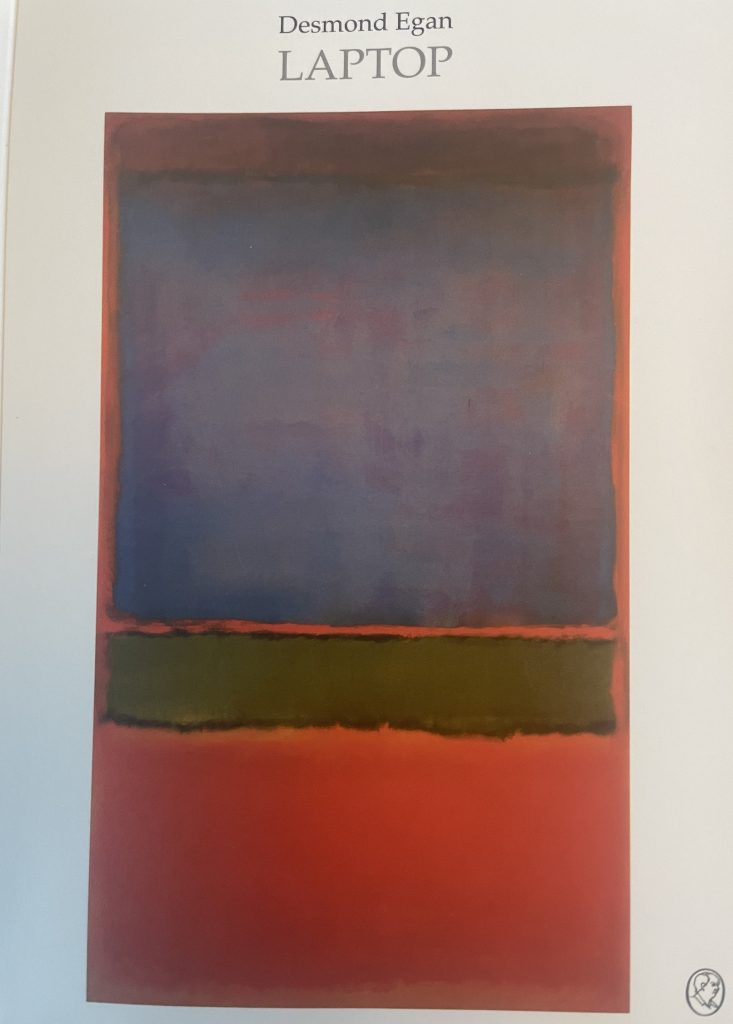
LAPTOP by Desmond Egan. Goldsmith Press, 2024. Book Review.
by Kevin T McEneaney
Desmond Egan was the first post-modern poet in Ireland when he published his book, Midlands in 1972. He eschewed traditional punctuation and rhyme from the outset, preferring short rhythmic phrases that freighted a confident lyrical ambiance. That approach made him an outsider, yet he became friendly with poets Michael Hartnett and Thomas Kinsella.
Being a teacher of classical Greek at Newbridge College, he saw the Greek underlying layers in the poet Gerard Manley Hopkins; he founded an annual week-long conference on the poetry and prose of Hopkins in 1989, which continues today. He has published two translations of Greek plays, Euripides and Sophocles, three collections of prose essays, and numerous books of poetry, which have been translated into 24 other languages.
The tone of LAPTOP is sculpted with mellow resonance. An impressive aerial lightness inhabits these lyrics, as if the syllables were liberated from the weight of gravity. The placid, yet observant, lyric tone echoes the delightful sound of lapping waters on a shoreline amid the flow of extended syntax:
bees will forage in the borage
and happy in their one day
midges will fidget above the pool
and a fly bump softly into summer
branches of the cherry you planted me
a few many years ago
will tingle in memories
One of Egan’s poetry books is titled Music, a theme he often returns to. In LAPTOP one finds the observation that “life without music is unlife.” Egan has cherished his long friendship with the noted pianist Hans Pålsson who regularly performs at the Hopkins International Festival (which includes contemporary poetry readings as well as academic papers).
Egan’s poetry straddles a world of intimacy and universal appeal. He occasionally writes poems about paintings (Cézanne and Rothko in this book) and sculpture. The sculptor and playwright James McKenna was a great friend of his.
There is a whisper of religious sentiment in a poem where he refers to the deity:
you of inspiration
of quicksilver skies and uneasy trees
of dignified blackbirds and crows in the know
Some poems have a light comic touch, others meditate on history. Egan has published many extended poems (on the Irish famine, the Holocaust, on landscape (Peninsula and The Hill of Allen), and there is one such masterful, extended poem in this book, “Memory Village,” which eulogizes recollections of childhood:
it slaps with their springdoor
rings from the flagstones
the walked living kitchen
the legacy of its crane where
their iron kettle hung and swung
under the navy tea-tins
There is deep poignancy and emotion in this litany of ambling childhood episodes that celebrate unusual recollections of joy that uplift the reader with eloquent sounds.
As Homer once sang, Memory is a mighty muse to guide the reader into the great song of life! These poems have a delightful range of pithy, resonant words ringing with musical underpinning.
P.S. The cover art is by Mark Rothko, “No 6, 1951.”